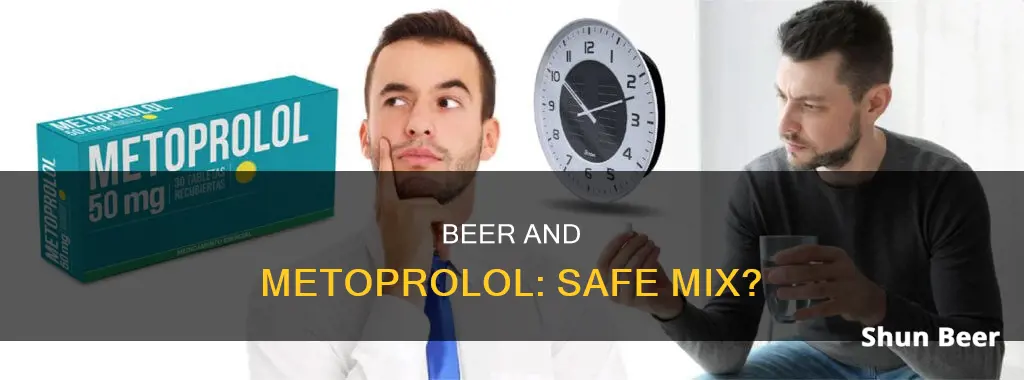
Mixing alcohol with beta-blockers like metoprolol can have some unpleasant and dangerous side effects. Both alcohol and metoprolol lower blood pressure, so drinking while taking this medication can cause a dangerous dip in blood pressure levels, leading to hypotension. This can cause side effects such as dizziness, lightheadedness, fainting, and changes in pulse or heart rate. It is generally recommended that you consult a doctor and exercise caution when it comes to drinking alcohol while taking beta-blockers.
| Characteristics | Values |
|---|---|
| Is it safe to drink beer while taking metoprolol? | Drinking alcohol while taking metoprolol is generally not advised by doctors. |
| Why? | Both metoprolol and alcohol lower blood pressure, so drinking alcohol while taking metoprolol can cause a dangerous dip in blood pressure known as hypotension. |
| What are the side effects? | Dizziness, lightheadedness, fainting, inability to concentrate, changes in pulse or heart rate. |
| What should I do? | Consult a doctor before drinking any alcohol while taking metoprolol. |
What You'll Learn
- Doctors advise against drinking alcohol while taking metoprolol
- Metoprolol and alcohol can cause a very low blood pressure level
- Alcohol can increase the side effects of metoprolol
- Drinking alcohol while taking metoprolol can cause orthostatic hypotension
- Long-term heavy alcohol consumption may limit the effectiveness of metoprolol

Doctors advise against drinking alcohol while taking metoprolol
The interaction between metoprolol and alcohol can also increase the risk of adverse effects on health conditions treated with beta-blockers, such as high blood pressure and cardiovascular diseases. Alcohol can cause blood pressure to fluctuate, making it difficult for the body to regulate blood pressure and disrupting the effectiveness of beta-blockers. Additionally, alcohol can interfere with the mechanism of action of beta-blockers, potentially diminishing their desired effects.
The potential risks and side effects of mixing metoprolol and alcohol should be carefully considered, and any decisions regarding alcohol consumption while taking this medication should be made in consultation with a healthcare provider. It is recommended to discuss alcohol consumption with a doctor to evaluate the potential risks and determine if any adjustments to medication or lifestyle are necessary.
While a glass or two of red wine in moderation is relatively safe when taking beta-blockers, excessive alcohol consumption can have detrimental effects on the body. Long-term heavy alcohol use can lead to liver disease, cirrhosis, an increased risk of certain cancers, high blood pressure, and cardiovascular diseases. Therefore, it is generally recommended to avoid alcohol while taking beta-blockers to ensure the efficacy of the medication and minimize potential risks.
Heart Condition and Beer: Is It Safe to Drink?
You may want to see also

Metoprolol and alcohol can cause a very low blood pressure level
Mixing alcohol and metoprolol can have adverse effects on your health. Metoprolol is a beta-blocker medication that relaxes the blood vessels and slows the heart rate to improve blood flow and decrease blood pressure. On the other hand, alcohol can also lower blood pressure and cause it to fluctuate. Therefore, drinking alcohol while taking metoprolol can lead to a dangerous drop in blood pressure levels, a condition known as hypotension.
The combination of metoprolol and alcohol can cause a range of side effects, including dizziness, lightheadedness, fainting, and changes in pulse or heart rate. These side effects are more likely to occur at the beginning of treatment, following a dose increase, or when treatment is restarted after an interruption. It is important to note that drinking alcohol can also adversely affect the health conditions that metoprolol is used to treat, such as high blood pressure, chest pain, and cardiovascular disease.
The effects of mixing alcohol and metoprolol can be unpredictable and may vary depending on the specific beta-blocker, the amount of alcohol consumed, and the individual's medical condition. While a glass or two of wine may be relatively safe in moderation, excessive alcohol consumption can have detrimental effects on the body. Long-term heavy drinking may also limit the effectiveness of metoprolol in controlling blood pressure and reducing the risk of cardiovascular events.
It is strongly advised to consult a doctor before consuming alcohol while taking metoprolol, as the potential risks and benefits should be carefully weighed. Cardiologists generally recommend against excessive alcohol consumption for individuals with cardiovascular diseases, as it can interfere with the benefits of medications like metoprolol. While moderate alcohol consumption may be permitted in some cases, it is crucial to determine the appropriate level of alcohol intake based on individual circumstances.
Beer Drinking and Slim Trimming: Is It Possible?
You may want to see also

Alcohol can increase the side effects of metoprolol
When metoprolol is taken with alcohol, it can lead to an increase in side effects such as dizziness, lightheadedness, fainting, and changes in pulse or heart rate. These side effects are more likely to occur at the beginning of treatment, after a dose increase, or when treatment is restarted after an interruption. Additionally, alcohol can enhance the drop in blood pressure caused by metoprolol, potentially leading to orthostatic hypotension, which is characterised by dizziness or fainting upon standing up from a seated or lying position.
The combination of metoprolol and alcohol can also cause an individual's blood pressure to fluctuate, making it difficult for the body to regulate blood pressure and disrupting the effectiveness of the medication. This can result in a dangerous condition called hypotension, where blood pressure drops to dangerously low levels.
Furthermore, alcohol can interfere with the mechanism of action of beta-blockers, potentially diminishing their desired effects. Long-term heavy alcohol consumption may reduce the effectiveness of metoprolol in controlling blood pressure and reducing the risk of cardiovascular events. Therefore, it is generally recommended to avoid alcohol while taking metoprolol, and any decisions regarding alcohol consumption should be made in consultation with a healthcare provider.
Beer and Malt Allergies: Can You Still Drink Beer?
You may want to see also

Drinking alcohol while taking metoprolol can cause orthostatic hypotension
- Fainting, especially when getting up too fast
- Headaches
- Dizziness or lightheadedness
- Inability to concentrate
- Changes in pulse or heart rate
These side effects are most likely to occur at the beginning of treatment, following a dose increase, or when treatment is restarted after an interruption. It is important to consult a doctor if these symptoms do not go away after a few days or become troublesome. To reduce the risk of orthostatic hypotension, it is recommended to avoid drinking alcohol while taking metoprolol.
The combination of metoprolol and alcohol can be dangerous as both substances have additive effects in lowering blood pressure. This can lead to a dangerously low blood pressure level, which can result in hypotension. Additionally, alcohol can affect how metoprolol is released into the body, increasing the risk of side effects. It is important to consult a doctor before consuming alcohol while taking metoprolol to weigh the risks and benefits.
Orthostatic hypotension is a common side effect of many medications, including beta-blockers like metoprolol. It is an important medical problem, particularly in elderly individuals with multiple comorbidities and polypharmacy. The condition is associated with an increased risk of falls, chronic kidney disease, and overall mortality. Therefore, it is crucial to manage both hypertension and orthostatic hypotension simultaneously to improve patient outcomes.
Beer Diet: Does It Work or Is It a Myth?
You may want to see also

Long-term heavy alcohol consumption may limit the effectiveness of metoprolol
Metoprolol is a beta-blocker medication that is used to treat high blood pressure, chest pain, and heart-related complications. It works by relaxing the blood vessels and slowing down the heart rate, thereby improving blood flow and reducing blood pressure.
While metoprolol is generally safe for long-term use, long-term heavy alcohol consumption may limit its effectiveness in managing blood pressure and reducing the risk of cardiovascular events. Alcohol can interfere with the mechanism of beta-blockers, potentially reducing their desired effects.
Heavy and frequent alcohol consumption can lead to high blood pressure and increase the risk of cardiovascular diseases. This counteracts the intended effects of metoprolol, which is often prescribed to manage hypertension and prevent heart-related issues. Therefore, it is advisable to exercise caution and moderation when consuming alcohol while taking this medication.
The combination of alcohol and metoprolol can also lead to an increased risk of side effects, such as dizziness, lightheadedness, and fainting. Both substances can have a depressant effect on the central nervous system, enhancing these adverse effects. Additionally, alcohol can enhance the drop in blood pressure caused by metoprolol, potentially leading to orthostatic hypotension. This condition causes a person's blood pressure to drop when standing up from a seated or lying position, resulting in dizziness or fainting.
It is important to consult a healthcare provider before making any decisions regarding alcohol consumption while taking metoprolol. They can provide personalized guidance and help determine if any adjustments to medication or lifestyle are necessary.
Tooth Extraction and Non-Alcoholic Beer: What's Safe?
You may want to see also
Frequently asked questions
Doctors advise against drinking alcohol while taking beta-blockers like metoprolol. Both metoprolol and alcohol lower your blood pressure, so drinking beer while taking metoprolol can cause your blood pressure to drop to dangerously low levels, resulting in hypotension.
The drug interaction between metoprolol and alcohol can lead to side effects such as dizziness, drowsiness, impaired coordination, fainting, and an inability to concentrate.
If you experience any side effects from drinking beer while taking metoprolol, you should consult your doctor or healthcare provider. It is important to continue taking metoprolol unless advised otherwise by a medical professional.
While a glass or two of red wine in moderation is considered relatively safe when taking beta-blockers, it is still generally recommended that you avoid alcohol altogether to ensure the efficacy of the drug. It is important to consult with your doctor about responsible drinking while taking your prescribed dosage of metoprolol.







